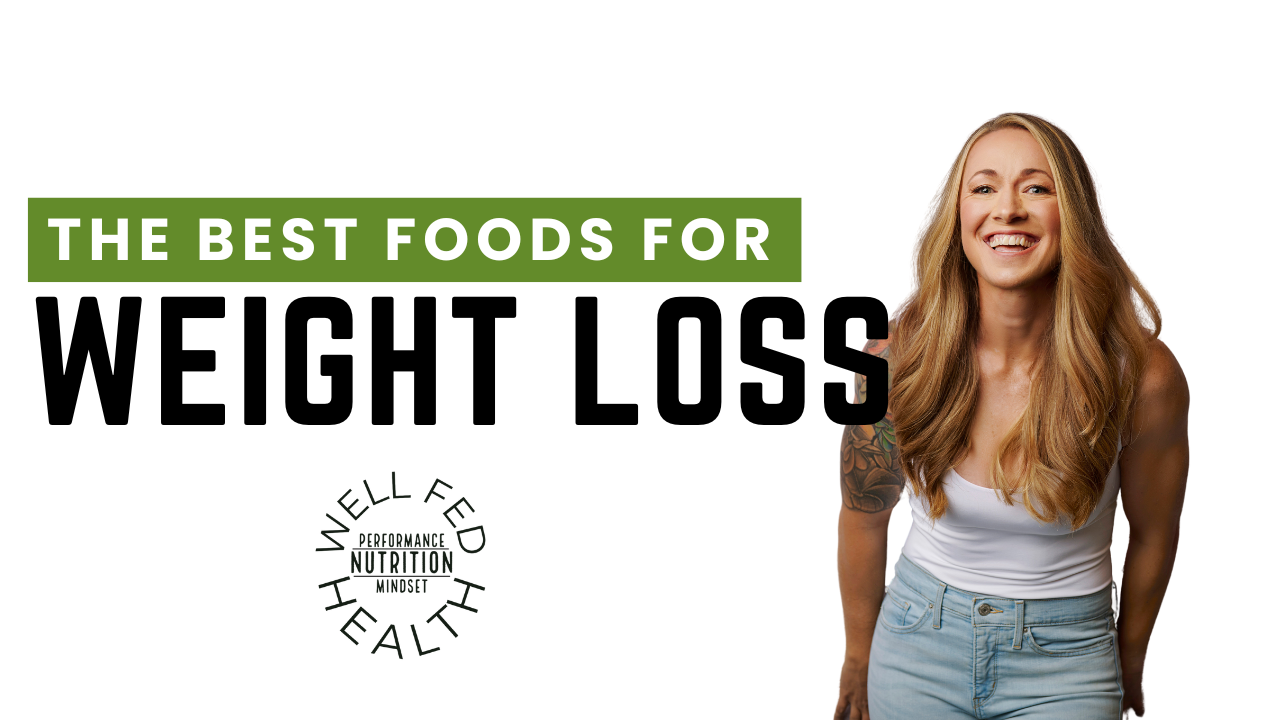
The Best Foods for Weight Loss: Why Real Food is the Answer
Let’s be real—there’s a LOT of information out there about weight loss. So much, in fact, that it can feel overwhelming to know what’s actually helpful and what’s just noise. But the fact that you’re here, searching and trying to build a stronger, healthier body? That’s something worth celebrating.
One of the most frequently asked questions I hear (and one of the most Googled) is:
👉 What are the best foods for weight loss?
So let’s tackle it. And let’s keep it simple.
The Best Foods for Weight Loss? REAL Food.
Yep, actual food. The kind that doesn’t come in a box with a mile-long ingredient list. Think:
✔️ Meats! From the best sources within your budget.
✔️ Minimally processed dairy and grains
✔️ Eggs, nuts & seeds
✔️ Vegetables & fruits
✔️ Healthy fats (avocado, olive oil, butter, etc.)
If it grew on earth or walked on earth, you’re on the right track.
But why does this work so well for weight loss? Let’s break it down.
Why Real Food is the Key to Sustainable Weight Loss
1. Nutrient-Dense, Lower in Calories
Real food is packed with nutrients but naturally lower in calories than processed foods. This makes it easier to stay in a calorie deficit (aka the key to fat loss) while still feeling full and satisfied.
2. Harder to Overeat
It’s way easier to eat an entire bag of chips than an entire plate of grilled chicken and roasted veggies. Whole foods naturally have more fiber, protein, and volume—all things that help you feel full and prevent mindless overeating.
3. No More Guessing Games
One of the biggest struggles people have with food? Constantly wondering if what they’re eating is “good” or “bad.”
Here’s the mindset shift: if you’re choosing real, whole foods, you’re already making a great choice. No more second-guessing. Just eat.
Why Processed Foods Make Weight Loss Harder
Now, I’m not here to demonize food. There’s no such thing as “good” or “bad” food. But there’s a huge difference between real food and food-like products that have been chemically engineered for taste, shelf-life, and profit—not your health.
Here’s why processed foods make weight loss harder:
❌ Calorie-Dense, Nutrient-Poor – You get a lot of calories but not a lot of nutrients, which leads to feeling unsatisfied and craving more.
❌ Designed to Be Addictive – Ever wonder why you can’t stop after just one chip? That’s by design. Processed foods are engineered to hit just the right balance of salt, fat, and sugar to keep you coming back.
❌ Messes With Hunger Cues – Highly processed foods can confuse your body's natural hunger and fullness signals, making it easier to overeat without realizing it.
Making the Swap to Real Food (Without Going Crazy)
The goal isn’t perfection—it’s progress.
Instead of trying to overhaul your entire diet overnight, try this:
✅ Swap one processed meal or snack per day for a whole food option.
✅ Plan at least 1-2 home-cooked meals per week to reduce reliance on convenience foods.
✅ Prioritize protein at every meal to stay fuller, longer.
Even a 1% improvement each week can add up to massive changes over time.
How to Build a Well-Balanced Plate
Now that you’re focusing on real, whole foods, let’s take it a step further and make sure you’re getting the right balance of macronutrients:
🍗 Protein – Your best friend for weight loss. Aim for 30-50g per meal to keep you full and support muscle.
🥔 Carbs – Yes, you need them! Choose whole-food carbs like fruit, veggies, and whole grains instead of refined options.
🥑 Fats – Essential for hormone health and cell function. Add healthy fats like nuts, avocado, butter, or olive oil.
Not sure where to start? My FREE Well Fed Health Meal Prep Guide breaks this all down even further.
Calories Still Matter—But Don’t Make It Complicated
At the end of the day, weight loss comes down to calories in vs. calories out.
But here’s the catch:
❌ Eating as little as possible doesn’t work.
❌ Cutting out entire food groups leads to burnout.
❌ Obsessing over every calorie makes the process miserable.
Instead, I encourage my clients to prioritize real food and focus on balance rather than restriction. It’s a lot easier (and more sustainable) that way.
Final Thoughts
So, what are the best foods for weight loss? Let’s recap:
✅ Eat as much real, whole food as possible.
✅ Reduce processed and packaged foods gradually.
✅ Balance your meals with protein, carbs, and fats.
✅ Understand your energy needs and focus on consistency over perfection.
I know this process can feel overwhelming, especially when all you want is to feel good in your body. That’s why coaching and community support can make all the difference.
If this information intrigued or excited you, you would LOVE my Well Fed Way 9-Week Habit Transformation. Imagine knowing exactly what your body needs—and building results that actually last.
Need help getting started? Send me your questions—I’d love to hear from you!
Coach Ashleigh 🦈
Owner, Well Fed Health
